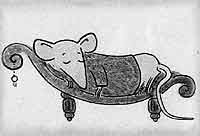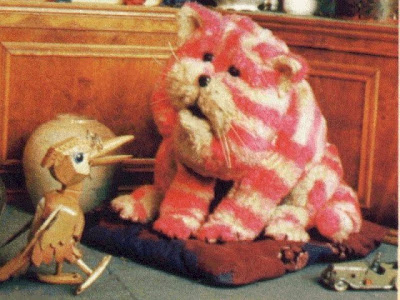I feel I have to write just a few short words about TV legend Oliver Postgate, who died today.
Postgate is the hero who, with Peter Firmin, made tons of children's TV shows from the 1950s to the 1980s, and in so doing had far more impact on the UK's children than he can ever have known.
Ivor The Engine, The Clangers, Bagpuss... These shows were so charming that even though the BBC repeated them for decades, we never got tired of them, or started to moan about them.
Postgate's role? He was the writer, the voice-over artist, and the film-maker, spending much of his life filming the animated shows alone in a cowshed, painstakingly adjusting models, and/or pushing cardboard cut-outs around a background with a paperclip. No wonder I find him such an inspiration.

A few years ago Herschel bought me Oliver Postgate's autobiography for my birthday, which opened up for me a new window into the man's life and creativity.
In fact it reveals that one of his earliest animated series sadly no longer exists – the monochrome Alexander The Mouse.

The reason for this 1950s series' junking? Because there were no copies to keep in the first place. Alexander The Mouse was animated live.
Yep, you read that right. Animated live.
Postgate had to wrangle all the character cut-outs around the screen, in real-time, on live television, via some small magnets hidden underneath the table. And this was tricky work. Sometimes the poles would accidentally get reversed, resulting in a two-dimensional character getting repelled instead, and flipping over the wrong way on national television! And the only way of fixing this was to reach in front of the camera with his hand...
While I myself would love to see those early shows for all the right reasons, (admittedly as well as for a few wrong ones) I got the impression that he was quite pleased that those programmes had now been accessioned by that great TV-archive in the sky. After all, he made so much more to be proud of afterwards.

The Clangers - creatures on another planet who ate blue-string soup and spoke through a series of swanee-whistles. Again in the autobiography, Postgate tells of his production battles, this time arguing with the BBC because they wanted it to have a narrator. Postgate protested that all the dialogue in his script was to be spoken in whistles, and that viewers would understand the dialogue, because all the inflexion would be the same, and in context.
The BBC believed him.
So much so that they later hauled him up to complain about the draft script's bad language. Postgate had hilariously started one episode with Major Clanger trying to get the sliding doors to his cave open, and was to exclaim in whistles "Oh sod it. The bloody thing's stuck again." Now Postgate found himself arguing the other way, claiming that kids would assume that Major Clanger had said "Oh dear me. The naughty thing is jammed again." Postgate was beaten, and reluctantly recorded a narration track for the series after all.
Years later, in 1984, to prove his undying conviction that his narration on The Clangers had been unnecessary, Postgate attended a conference in Germany, where he screened an episode without the narration-track, before asking the audience if they had understood what was being said.
"But of course," the German audience-members agreed. "They are speaking perfect German."
Well, if you're German. A Swede who was present protested they'd actually been speaking in Swedish…
Speaking of international incidents, Postgate also wrote of his fears about the broadcast of the Clangers' most famous episode…
I shall always remember, with a certain dread, a note of realism that turned up in one episode. In it a human astronaut arrives in a space module and attempts to collect rocks from the Clangers’ moon. The Clangers try to help but he is alarmed. Many mishaps befall him. He slips into a soup-well, is rescued, runs away so fast that he goes into low orbit and has to be captured with a fishing-magnet, and is finally stuffed back into his module. There is nothing unusual about any of that. What was unusual was the fact that it was scheduled to be transmitted on the same
day as one of the Apollo missions was due to land on the moon. I pleaded with the BBC to show something else, but in vain. I am still haunted by the thought that if the mission had failed and the astronauts had perished (as well they might have done), that Clangers transmission would have been one of the blackest jokes in television history.

But I think that most people will agree that Oliver Postgate's best-loved creation is Bagpuss.
And yet the series in which the baggy old cloth cat and his friends would routinely find a lost broken thing and mend it was made in the tragic months following his mother's death.
How awful must the lonely experience of making those shows have been for him? And yet out of such unimaginable devastation, came so much joy, for so many, for so long.
In later life, with umpteen series behind him, Postgate remained creative, and became something of an activist against the nuclear deterrent, specifically against the misleading use of the phrase 'nuclear weapons.'
Weapons, he pointed-out, enabled the bearer to win a battle. The use of any nuclear strike however would result in the falling of both sides. The use of the word 'weapon' was sanitising a worse-case scenario into sounding somehow understandable.
He also pointed-out that war itself has become out-of-date, since it is now impossible for any country to win a war.
Stark, cutting observations.
The last memory I have to share is of his words in an interview he gave in 2005, about the modern state of children's television, and in particular what became of his own Noggin The Nog revival...
I think there's an economic side-effect of children becoming a market, which is that originality and fun have to take second place to the investment millions.
Well, the first thing I said was, there's no such thing as today's children, because children come along new every so often, and they don't belong to today until today has got at them.
People have tried to remake Noggin, for instance, for today's children. They put together a presentation, and then they had to go round the world collecting subscriptions to the immense quantity of money they would need to make it, a thousand times as much as I had.
They took it to each television station around the world, and each one wanted the story altered in order to suit their largest audience. By the time it had been round and come back again, it was a completely different story. It had absolutely no connection with what we'd done.
They regarded The Saga of Noggin the Nog as the basis on which they'd impose their own thing. I said, 'Look, if you want to go away and make a film about that, then do so, it's nothing to do with us.'
Our good luck was that we were not hampered by having to serve the purposes of money. Film makers, like publishers, go forward by looking over their shoulder. They do things that have already shown themselves to be successful. They pick up a formula and say, 'That works, we will do something else on it. We're putting a million pounds into it, we can't afford for it to be original.'
Or, as he had earlier put it to a group of Australian filmmaking students in the 80s:
You can’t reconstitute art from intellectual data. It is a part of love.
Thanks, Oliver Postgate, for all that love.


 :)
:)

 Brett
Brett Random Dave
Random Dave Scottish Dave
Scottish Dave Frank
Frank Greg
Greg Herschel
Herschel Jacob
Jacob Jean
Jean Joe
Joe Jonathan
Jonathan Melissa
Melissa Melva
Melva Paul
Paul The Reynolds
The Reynolds Rhett
Rhett Sara
Sara Sarah
Sarah Tim
Tim My church
My church
0 comment(s):
Post a Comment
<< Back to Steve's home page